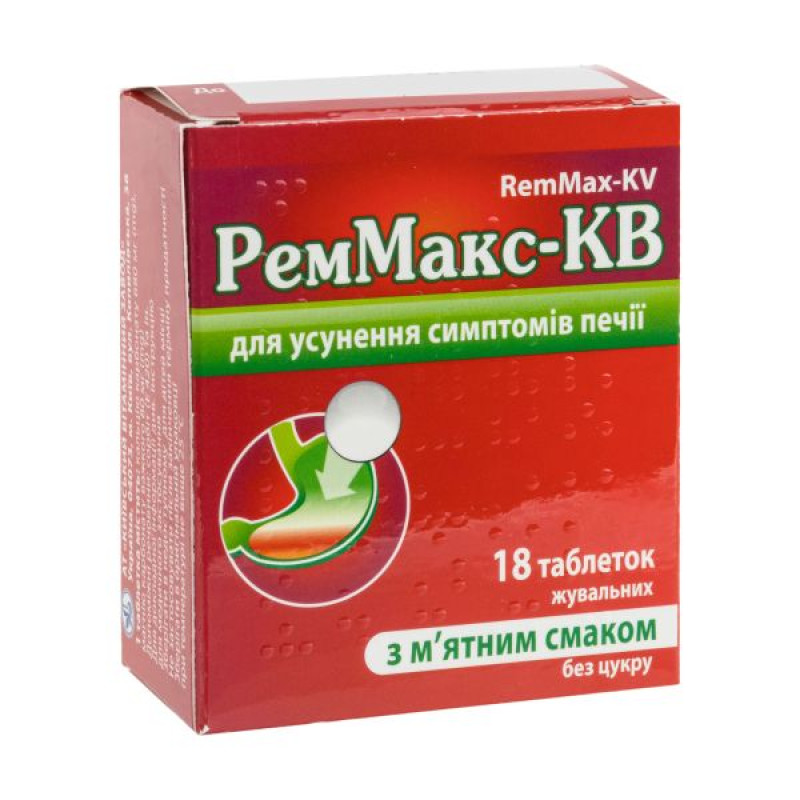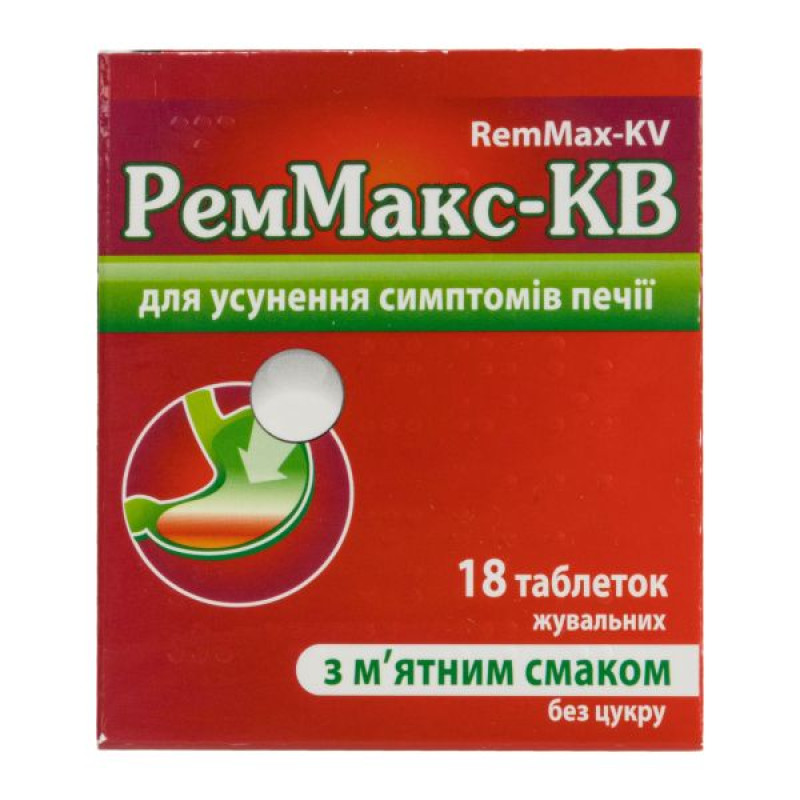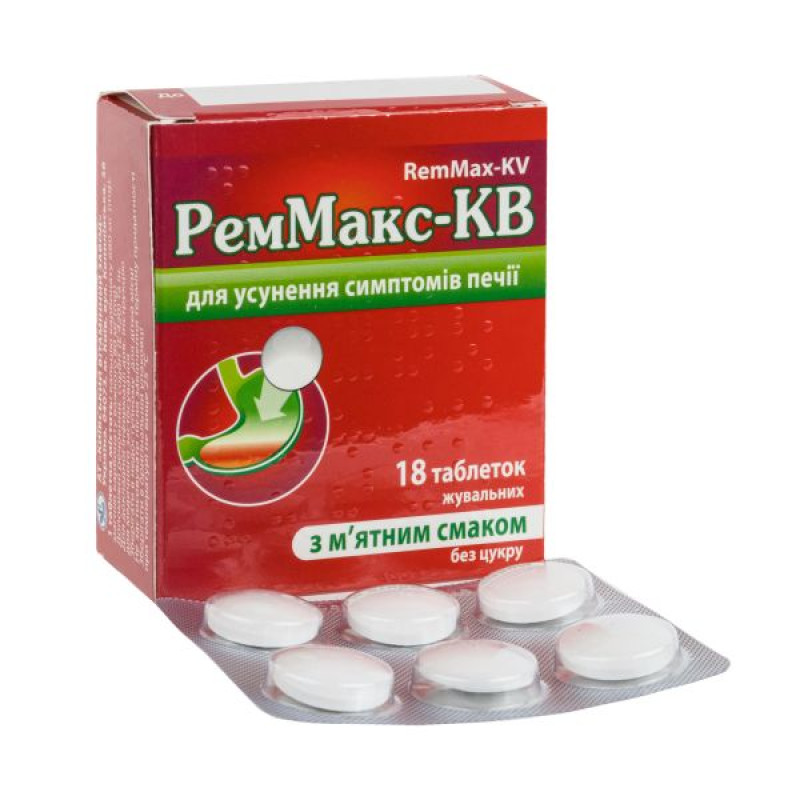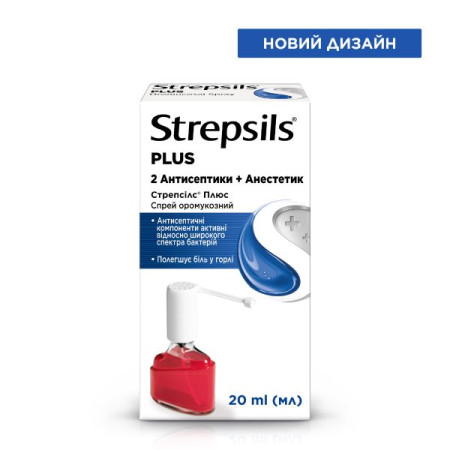Remmax-KV chewable tablets 680 mg + 80 mg blister with mint flavor No. 18

Instructions for Remmax-KV chewable tablets 680 mg + 80 mg blister with mint flavor No. 18
Composition
active ingredients:
1 tablet contains calcium carbonate 680 mg, heavy magnesium carbonate 80 mg;
excipients:
mint-flavored tablets: sorbitol (E 420), pregelatinized starch, potato starch, talc, magnesium stearate, light mineral oil, mint flavoring, sodium saccharin;
orange-flavored tablets: sorbitol (E 420), pregelatinized starch, potato starch, talc, magnesium stearate, light mineral oil, orange flavoring, sodium saccharin;
raspberry-flavored tablets: sorbitol (E 420), pregelatinized starch, potato starch, talc, magnesium stearate, light mineral oil, raspberry flavoring, sodium saccharin.
Dosage form
Chewable tablets with mint, orange, or raspberry flavor.
Main physicochemical properties:
mint-flavored tablets
Round tablets with a biconvex surface, white or almost white in color with a mint taste and smell;
orange-flavored tablets
Round tablets with a biconvex surface, white or almost white in color with an orange taste and smell;
raspberry-flavored tablets
Round tablets with a biconvex surface, white or almost white in color with a raspberry taste and smell.
Pharmacotherapeutic group
Antacids, other combinations. ATX code A02A X.
Pharmacological properties
Pharmacodynamics
RemMax-KV is a combination of two antacids: calcium carbonate and magnesium carbonate, which have a local effect by neutralizing gastric acid, which is independent of systemic absorption. Calcium carbonate has a long-lasting and strong neutralizing activity. This effect is enhanced by magnesium carbonate, which also has a strong neutralizing activity. The total neutralizing capacity of the drug in vitro is 16 mEq H+ (titration to an end point of pH 2.5).
Pharmacokinetics
In healthy individuals, the onset of neutralization is rapid. Administration of 2 tablets of the drug on an empty stomach results in an increase in pH of more than 1 unit within 5 minutes and a significant increase in the pH of the gastric contents above the baseline pH, which is achieved within 2 minutes.
In the stomach, calcium carbonate and magnesium carbonate react with gastric juice to form water and soluble mineral salts.
Calcium and magnesium can be absorbed in the form of their soluble salts. The level of absorption of calcium and magnesium from these compounds depends on the dose of the drug. The maximum level of absorption is 10% of calcium and 15-20% of magnesium. In healthy individuals, a small amount of absorbed calcium and magnesium is excreted by the kidneys. If their function is impaired, the level of calcium and magnesium concentration in the blood plasma may increase. In the intestine, insoluble compounds are formed from soluble salts, which are excreted in the feces.
Indication
Adults and children aged 15 years and over to relieve symptoms associated with increased gastric acidity (e.g. heartburn, gastroesophageal reflux) leading to indigestion and dyspepsia.
Contraindication
- Increased individual sensitivity to the components of the drug;
- hypercalcemia and/or conditions leading to hypercalcemia;
- nephrolithiasis, caused by the deposition of stones containing calcium;
- severe renal failure (creatinine clearance below 30 ml/min);
- hypophosphatemia.
Interaction with other medicinal products and other types of interactions
It is recommended to use other medications 1-2 hours before or after using RemMax-KV.
In the case of simultaneous use of the drug RemMax-KV with antibiotics (tetracyclines, quinolones) and cardiac glycosides (digoxin), phosphates, fluorine compounds and iron-containing products, levothyroxine and eltrombopag, the absorption of the latter decreases.
Thiazide diuretics reduce urinary calcium excretion and increase serum calcium levels. Due to the increased risk of hypercalcemia, serum calcium levels should be monitored regularly during concomitant use of thiazide diuretics.
You should also take a 2-hour break between using RemMax-KV and the following medications: antihistamines, atenolol, metoprolol or propranolol, chloroquine, diflunisal, digoxin, diphosphonates, fexofenadine, glucocorticoids (prednisolone and dexamethasone), indomethacin, ketoconazole, phenothiazid neuroleptics, penicillamine, thyroxine.
Application features
It is recommended to consult a doctor in case of: weight loss, problems with swallowing or a constant feeling of discomfort in the abdomen, signs of digestive disorders, if they appear for the first time or change their nature, in case of kidney failure (it is necessary to monitor the level of calcium and magnesium in the blood plasma).
Calcium carbonate and magnesium carbonate should not be used in hypercalciuria. This drug should be used with caution in patients with impaired renal function. If calcium carbonate and magnesium carbonate must be used in these patients, regular monitoring of plasma calcium, phosphorus and magnesium levels should be performed.
For patients with diabetes: 1 tablet of RemMax-KV contains saccharin, as well as 400 mg of sorbitol (for tablets with mint and raspberry flavors) and 390 mg of sorbitol (for tablets with orange flavor); the drug can be used in patients with diabetes.
Use during pregnancy or breastfeeding
To date, no increased risk of fetal malformations has been observed after the administration of calcium carbonate and magnesium carbonate during pregnancy. RemMax-KV can be administered during pregnancy if the drug is used according to the instructions, but prolonged use of high doses should be avoided. It should also be taken into account that the presence of magnesium salts can cause diarrhea, and the presence of calcium in high doses used for a long time increases the risk of hypercalcemia with calcification of various organs, including the kidneys.
It should be noted that during pregnancy or breastfeeding, calcium carbonate and magnesium carbonate provide a significant amount of calcium in addition to the amount received with food. Therefore, pregnant women should limit the period of use of the drug RemMax-KV to 1 week and during the use of the drug avoid constant consumption of milk (1 liter contains up to 1.2 g of elemental calcium), as well as dairy products to prevent excess calcium, which can lead to the so-called milk-alkali syndrome (Burnet syndrome), which is a rare but serious disease that requires medical attention.
Ability to influence reaction speed when driving vehicles or other mechanisms
No effect.
Method of administration and doses
Oral medicinal product for adults and children aged 15 years and over. The usual daily dose is 1-2 chewable tablets during periods of pain or heartburn; in case of pain, the dose can be increased for a short period to 5 tablets per day. The duration of treatment should not exceed 10 days.
Children
Do not use in children under 15 years of age.
Overdose
Symptoms: Prolonged use of high doses of calcium carbonate and magnesium carbonate, especially in patients with impaired renal function, may lead to renal failure, hypermagnesemia, hypercalcemia and alkalosis, which manifests itself in the form of gastrointestinal symptoms (nausea, vomiting, constipation) and muscle weakness. In case of overdose, diarrhea may also develop.
Treatment: The drug should be discontinued and adequate fluid intake should be ensured. In severe cases of overdose (e.g., Burnett syndrome), a doctor should be consulted, as additional rehydration (e.g., infusions) may be necessary.
Adverse reactions
Immune system disorders: hypersensitivity reactions including rash, urticaria, angioedema, anaphylaxis.
Metabolism and nutrition: in patients, especially with impaired renal function, prolonged use of high doses may lead to hypermagnesemia (when using magnesium-containing antacids) or hypercalcemia and alkalosis, which manifests itself in the form of gastric symptoms and muscle weakness.
Gastrointestinal: nausea, vomiting, stomach discomfort and diarrhea.
Musculoskeletal and connective tissue disorders: muscle weakness.
Side effects observed only in milk-alkali syndrome (Burnet syndrome):
Gastrointestinal disorders (ageusia); general disorders (calcinosis and asthenia); nervous system disorders (headache); renal and urinary tract disorders (azotemia).
Expiration date
2 years.
Storage conditions
Store in the original packaging at a temperature not exceeding 25 °C.
Keep out of reach of children.
Packaging
6 tablets in a blister; 3 blisters in a pack.
Vacation category
Without a prescription.
Producer
PJSC "Kyiv Vitamin Plant".
Location of the manufacturer and its business address
04073, Ukraine, Kyiv, Kopylivska St., 38.
Website: www.vitamin.com.ua.
There are no reviews for this product.
There are no reviews for this product, be the first to leave your review.
No questions about this product, be the first and ask your question.













